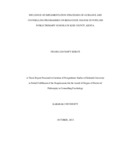INFLUENCE OF IMPLEMENTATION STRATEGIES OF GUIDANCE AND COUNSELLING PROGRAMMES ON BEHAVIOUR CHANGE OF PUPILS IN PUBLIC PRIMARY SCHOOLS IN KISII COUNTY, KENYA
Abstract
A well-implemented guidance and counselling programme fosters a positive behaviour among pupils in public primary schools. There are persistent incidences of substance and alcohol abuse, absenteeism, early pregnancies, premarital sex, lack of respect for authority and many school dropouts in public primary schools in Kisii County. There is a gap in assessing what is influencing the persistence of this misbehavior as it had not been empirically investigated. The purpose of the study was to assess the influence of implementation strategies of guidance and counselling programmes on behaviour change of pupils in public primary schools in Kisii County, Kenya. The objectives of the study were; to evaluate the extent of application of compressive guidance and counselling programmes and their influence on behaviour change of pupils in Kisii county, to investigate the levels of training of teacher counsellors involved in the implementation strategy of guidance and counselling programmes and their influence on behavior change of pupils in Kisii county, to establish the extent of resource allocation strategy for the implementation of guidance and counselling programme and its influence on behavior change of pupils in Kisii county, to assess the role of head teachers` in the implementation strategies of guidance and counselling programmes and their influence on behavior change of pupils in Kisii County. The research may be a source of knowledge to teacher-counselors, head teachers, parents and the ministry of education. The study used correlation and descriptive research design. The targeted population consisted of 3,837 involving 2,745 standard eight pupils, 696 teacher counselor and 696 head teachers from 696 schools in Kisii County. The sample size comprised of 408 respondents with 69 teacher-counselors, 69 head teachers and 272 pupils from the selected schools. Simple random sampling and purposive sampling was used to collect data from samples. Both qualitative and quantitative data was collected by administering questionnaires to pupils, teacher counselor, and head teachers. Questionnaires were pilot tested using Cronbach's coefficient Alpha to determine the internal consistency of the items and were found to have a reliability of 0.775. Descriptive statisticsused to analyze data involved frequencies, means, and percentages. The statistical package for social sciences (SPSS) version 22 helped in data analysis. The results revealed positive relationship r = 0.084 between the level of application of comprehensive guidance and counseling and behavior change. Additionally, Comprehensive guidance and counseling, teacher training and the roles of head teachers were statistically insignificant to influence behavior change of pupils in public primary schools. However, the Analysis of Variance (ANOVA) revealed that resource allocation is statistically significant in influencing the behavior change of pupils in public primary schools. In conclusion, well-organized counseling programmes, teacher counselors training and the roles of head teachers alone may not influence behaviour change of pupils. The study recommends an integrated approach to guidance and counselling with an emphasis on attitude and adequate resource allocation to make it a success.

